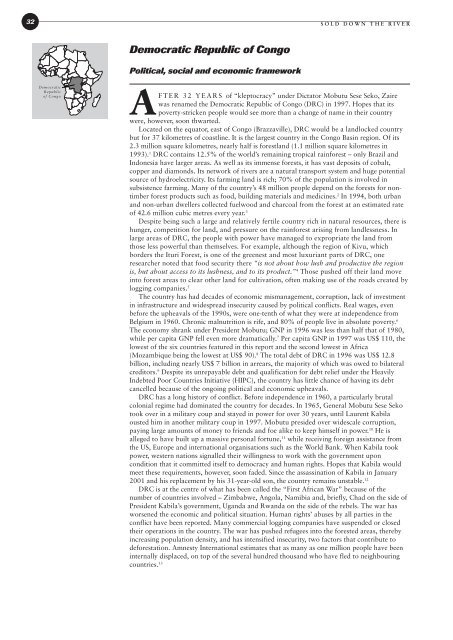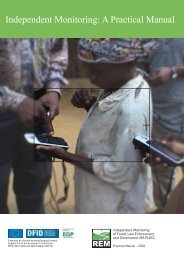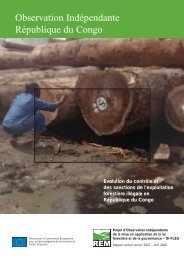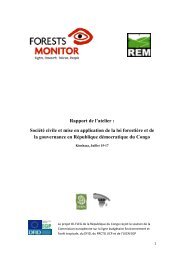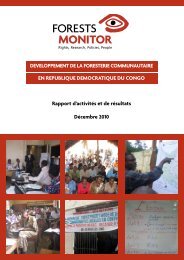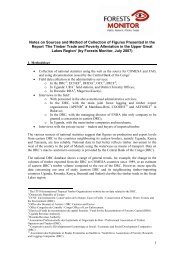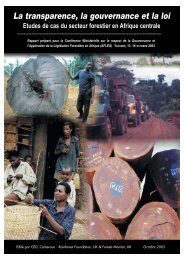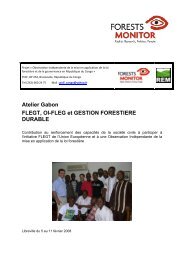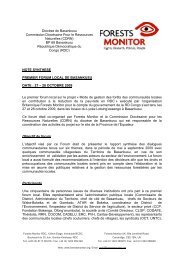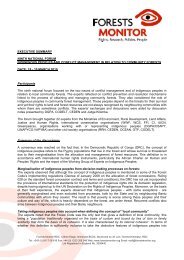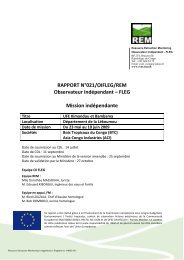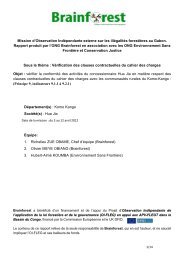Sold down the river - Salva le Foreste
Sold down the river - Salva le Foreste
Sold down the river - Salva le Foreste
Create successful ePaper yourself
Turn your PDF publications into a flip-book with our unique Google optimized e-Paper software.
32SOLD DOWN THE RIVERDemocratic Republic of CongoPolitical, social and economic frameworkDemocraticRepublicof CongoAFTER 32 YEARS of “k<strong>le</strong>ptocracy” under Dictator Mobutu Sese Seko, Zairewas renamed <strong>the</strong> Democratic Republic of Congo (DRC) in 1997. Hopes that itspoverty-stricken peop<strong>le</strong> would see more than a change of name in <strong>the</strong>ir countrywere, however, soon thwarted.Located on <strong>the</strong> equator, east of Congo (Brazzavil<strong>le</strong>), DRC would be a landlocked countrybut for 37 kilometres of coastline. It is <strong>the</strong> largest country in <strong>the</strong> Congo Basin region. Of its2.3 million square kilometres, nearly half is forestland (1.1 million square kilometres in1993). 1 DRC contains 12.5% of <strong>the</strong> world’s remaining tropical rainforest – only Brazil andIndonesia have larger areas. As well as its immense forests, it has vast deposits of cobalt,copper and diamonds. Its network of <strong>river</strong>s are a natural transport system and huge potentialsource of hydroe<strong>le</strong>ctricity. Its farming land is rich; 70% of <strong>the</strong> population is involved insubsistence farming. Many of <strong>the</strong> country’s 48 million peop<strong>le</strong> depend on <strong>the</strong> forests for nontimberforest products such as food, building materials and medicines. 2 In 1994, both urbanand non-urban dwel<strong>le</strong>rs col<strong>le</strong>cted fuelwood and charcoal from <strong>the</strong> forest at an estimated rateof 42.6 million cubic metres every year. 3Despite being such a large and relatively ferti<strong>le</strong> country rich in natural resources, <strong>the</strong>re ishunger, competition for land, and pressure on <strong>the</strong> rainforest arising from land<strong>le</strong>ssness. Inlarge areas of DRC, <strong>the</strong> peop<strong>le</strong> with power have managed to expropriate <strong>the</strong> land fromthose <strong>le</strong>ss powerful than <strong>the</strong>mselves. For examp<strong>le</strong>, although <strong>the</strong> region of Kivu, whichborders <strong>the</strong> Ituri Forest, is one of <strong>the</strong> greenest and most luxuriant parts of DRC, oneresearcher noted that food security <strong>the</strong>re “is not about how lush and productive <strong>the</strong> regionis, but about access to its lushness, and to its product.” 4 Those pushed off <strong>the</strong>ir land moveinto forest areas to c<strong>le</strong>ar o<strong>the</strong>r land for cultivation, often making use of <strong>the</strong> roads created bylogging companies. 5The country has had decades of economic mismanagement, corruption, lack of investmentin infrastructure and widespread insecurity caused by political conflicts. Real wages, evenbefore <strong>the</strong> upheavals of <strong>the</strong> 1990s, were one-tenth of what <strong>the</strong>y were at independence fromBelgium in 1960. Chronic malnutrition is rife, and 80% of peop<strong>le</strong> live in absolute poverty. 6The economy shrank under President Mobutu; GNP in 1996 was <strong>le</strong>ss than half that of 1980,whi<strong>le</strong> per capita GNP fell even more dramatically. 7 Per capita GNP in 1997 was US$ 110, <strong>the</strong>lowest of <strong>the</strong> six countries featured in this report and <strong>the</strong> second lowest in Africa(Mozambique being <strong>the</strong> lowest at US$ 90). 8 The total debt of DRC in 1996 was US$ 12.8billion, including nearly US$ 7 billion in arrears, <strong>the</strong> majority of which was owed to bilateralcreditors. 9 Despite its unrepayab<strong>le</strong> debt and qualification for debt relief under <strong>the</strong> HeavilyIndebted Poor Countries Initiative (HIPC), <strong>the</strong> country has litt<strong>le</strong> chance of having its debtcancel<strong>le</strong>d because of <strong>the</strong> ongoing political and economic upheavals.DRC has a long history of conflict. Before independence in 1960, a particularly brutalcolonial regime had dominated <strong>the</strong> country for decades. In 1965, General Mobutu Sese Sekotook over in a military coup and stayed in power for over 30 years, until Laurent Kabilaousted him in ano<strong>the</strong>r military coup in 1997. Mobutu presided over widesca<strong>le</strong> corruption,paying large amounts of money to friends and foe alike to keep himself in power. 10 He isal<strong>le</strong>ged to have built up a massive personal fortune, 11 whi<strong>le</strong> receiving foreign assistance from<strong>the</strong> US, Europe and international organisations such as <strong>the</strong> World Bank. When Kabila tookpower, western nations signal<strong>le</strong>d <strong>the</strong>ir willingness to work with <strong>the</strong> government uponcondition that it committed itself to democracy and human rights. Hopes that Kabila wouldmeet <strong>the</strong>se requirements, however, soon faded. Since <strong>the</strong> assassination of Kabila in January2001 and his replacement by his 31-year-old son, <strong>the</strong> country remains unstab<strong>le</strong>. 12DRC is at <strong>the</strong> centre of what has been cal<strong>le</strong>d <strong>the</strong> “First African War” because of <strong>the</strong>number of countries involved – Zimbabwe, Angola, Namibia and, briefly, Chad on <strong>the</strong> side ofPresident Kabila’s government, Uganda and Rwanda on <strong>the</strong> side of <strong>the</strong> rebels. The war hasworsened <strong>the</strong> economic and political situation. Human rights’ abuses by all parties in <strong>the</strong>conflict have been reported. Many commercial logging companies have suspended or closed<strong>the</strong>ir operations in <strong>the</strong> country. The war has pushed refugees into <strong>the</strong> forested areas, <strong>the</strong>rebyincreasing population density, and has intensified insecurity, two factors that contribute todeforestation. Amnesty International estimates that as many as one million peop<strong>le</strong> have beeninternally displaced, on top of <strong>the</strong> several hundred thousand who have f<strong>le</strong>d to neighbouringcountries. 13


